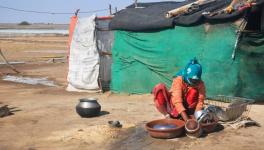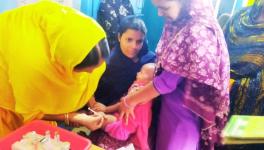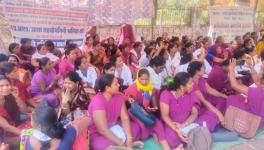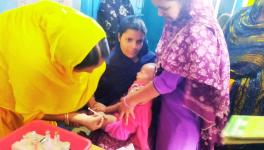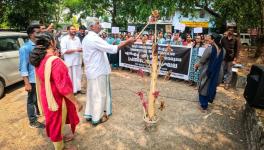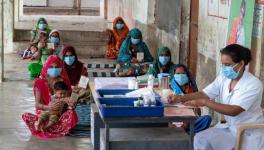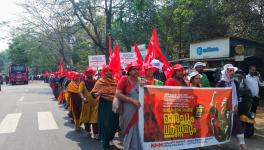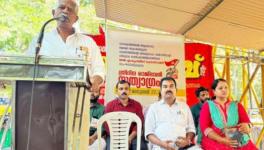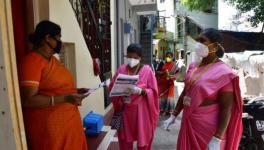Early Initiation of Breastfeeding Declines in 12 States and UTs: NFHS 5
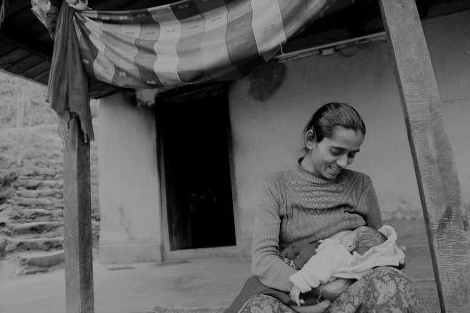
Sarita Pawar, a 45-year old Mumbai-based community health worker, used to counsel a number of pregnant women on optimal breastfeeding practices. But, when it came to her own daughter-in-law, she had to fight with the nurses and sign an indemnity form.
When Pawar’s daughter-in-law delivered in March 2019, the nurses at the hospital forbade breastfeeding in the first hour of life which is a recommended practice. When she was told that the child would be fed ‘Lactogen’(formula milk) because the mother cannot produce enough milk, she insisted that her grandchild be fed only breastmilk.
“What is the point of counselling and spreading awareness if I can’t get my own daughter-in-law to breastfeed within an hour. So I took the baby and signed a paper saying that if anything happens, it would be my fault,” she told NewsClick.
But, Sarita Pawar’s story is an exception.
Early initiation of breastfeeding (EIBF) is a recommended practice that prevents 20% of neonatal deaths but the share of children who actually receive it is low. In Mumbai alone, only 51% new borns were breastfed within the first hour, even though 99.5% of deliveries occurred in institutional facilities, according to the latest round of the National Family Health Survey (NFHS).
According to data from the phase I of the survey which was released in December 2020, there has been a decline in early breastfeeding in as many as 12 of the 22 surveyed states and Union Territories. At the same time, the share of institutional births has increased in almost all the surveyed states and in 14 states, it is more than 90%.
The percentage of babies who were breastfed within an hour of birth fell sharply in Sikkim – a dip of 15% points – followed by Dadra & Nagar Haveli and Daman & Diu, Assam, Goa, Gujarat and Manipur. Lack of early breastfeeding is more pronounced in Bihar and Sikkim where only three out of every 10 babies are breastfed.
Also read: 8.82 Lakh Under-5 Deaths in India in 2018: UNICEF Report
Only five states and Union Territories – Andhra Pradesh (52%), Meghalaya (78.8%), West Bengal (59.4%) Lakshadweep (76.3%) and Jammu Kashmir (55.6%), reported substantial progress.
According to the 2018 ‘Capture the Moment’ report by UNICEF and World Health Organisation, it is estimated that 78 million babies – or three in five – are not given first milk or colostrum and this puts them at higher risk of death and disease, and eventually makes them less likely to continue breastfeeding.
Colostrum, which is secreted ahead of regular milk in the first few days, is considered to be rich in nutrients and antibodies and often referred to as the baby’s first vaccine.
A study published in the journal Health Policy and Planning estimated that 99,499 children die each year in India as a result of cases of diarrhoea and pneumonia which could have been prevented through early initiation of breastfeeding, exclusive breastfeeding for the first six months, and continued breastfeeding.
However, Dr. Arun Gupta, central co-ordinator of the Breastfeeding and Promotion Network of India (BPNI), said that the benefit of reducing mortality from diarrhoea and pneumonia through breastfeeding practices can be realised only if we attain universal coverage.
Rampant C-sections and growing influence of formula companies
In the last five years, C-section rates increased in 19 states and Union Territories and the highest increase was reported by Ladakh where it jumped from 16.1% to 37.6%. Among the surveyed states, Sikkim, which reported one of the lowest EIBF rates, had an increase of nearly 12 percentage points.
Dr Rupal Dalal, adjunct associate professor at the Centre for Technology Alternatives for Rural Areas, IIT Bombay, said, “In institutional deliveries with high C-sections, paediatricians are reluctant to allow mothers to breastfeed within an hour, instead formulas are given for the first three days. This is because doctors have a wrong notion that mothers who undergo C-section don’t have enough milk.”
Meanwhile, caesarean delivery rates have more than doubled in India. Between 2005-06 to 2015-16, it rose from 8% to 17% while the threshold recommended by the WHO is 10% to 15%. As per phase I of NFHS 5, in 18 states and Union Territories the C-section share is more than the WHO standard.
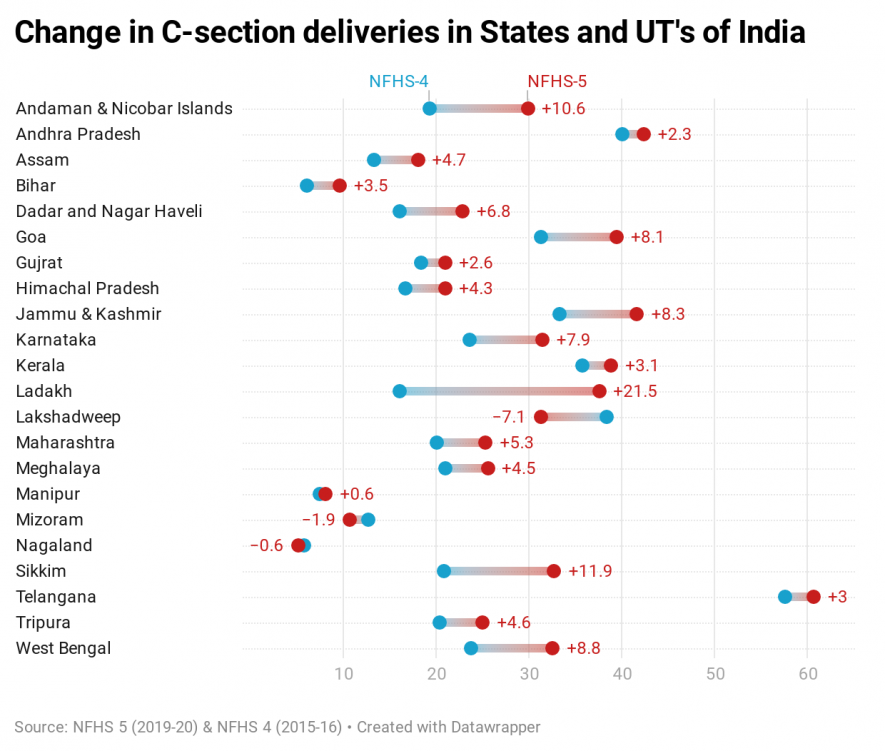
Also read: Babies Delivered by Caesarean Not Breastfed on Time, Doctors Lack Training
The other barrier in early breastfeeding has been the influence of formula companies on doctors. A doctor who did not wish to be named, said, “A number of formula companies bribe doctors to write for formula powder. This is true for nurses also. So even though parents may know about it, they don’t go against the doctor.”
Dr. Gupta also laid stress on the unnecessary use of infant formula. “A World Bank study found that nobody talks about it to women during pregnancy and so they are not prepared. Doctors who are friendly with companies often push formula at birth for reasons like not enough production of milk even though every mother can and production is not an issue. It is more of an attitudinal issue.”
The World Bank study, which was released in October 2019, stated that, “Infant formula manufacturer’s representatives were found to visit hospitals promoting their brands… In case a mother complained of ‘not enough milk’ the health staff were found to prescribe infant formula or glucose water.”
Substandard performance in exclusive breastfeeding
WHO and UNICEF also recommend that babies should be exclusively breastfed for the first six months and no other foods or liquids should be provided. While the latest NFHS data might suggest an increase in figures, the experts believe that there isn’t any progress.
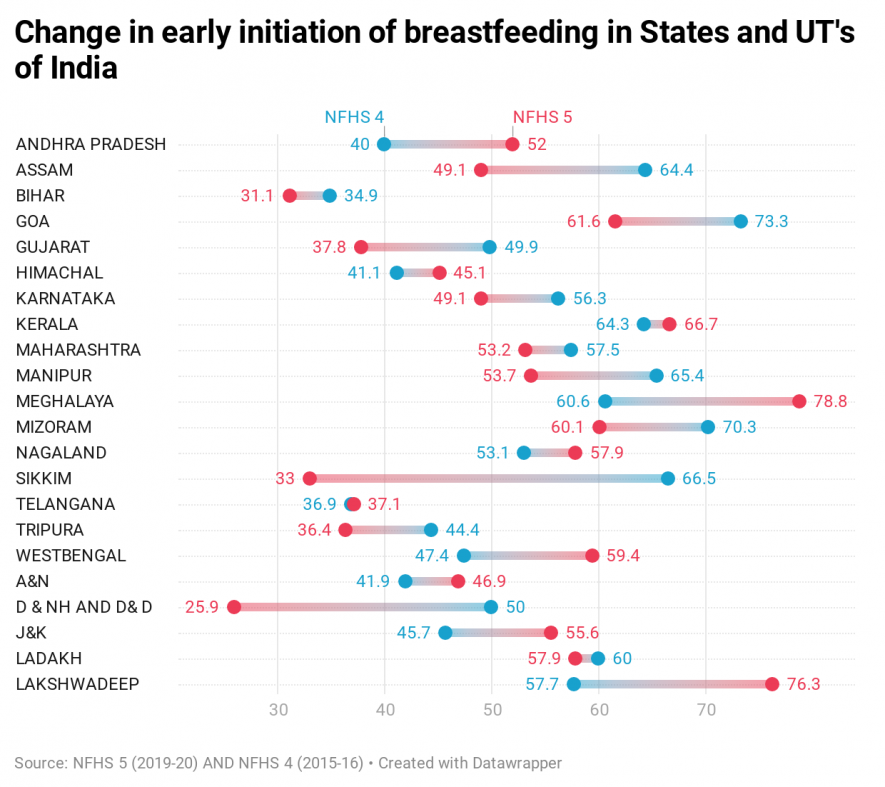
Only Maharashtra, Dadra and Nagar Haveli and Lakshadweep saw substantial progress, of over 10 percentage points and in six states and Union Territories, the share declined.
“We are at a loss in exclusive breastfeeding too,” Dr. Gupta said, and added that, “From NFHS 3 to NFHS 4 we got a 1% point increase every year which was a result of three decades of work. But in NFHS 5, we gained 0.5% point per year as opposed to 1% point. I call it retrograde progress. There is a chance that after 10 years it will come down if the government doesn’t improve the support system at the block level.”
Also read: India Will Not Meet Nutrition Goals by 2022 at Current Rate, Says Study
Dr. Dalal said, “Even though there have been some gains on the breastfeeding rates, stunting levels have not declined. So, this means mothers are breastfeeding but transfer is not happening because of faulty techniques.” She explained that if babies don’t gain enough weight in the first six months,
their growth falters. Mothers also do not know what should be given to babies after six months of exclusive breastfeeding and due to this their weight falls even more.
Status of Mother’s Absolute Affection Programme (MAA)
In order to improve the breastfeeding and child feeding practices in the country, the Ministry of Health and Family Welfare initiated a nationwide programme called Mother’s Absolute Affection in August 2016. The programme, launched under the National Health Mission, aimed to promote and support breastfeeding and child feeding at community and facility levels.
Despite a full-fledged government programme that focuses on breastfeeding, there hasn’t been substantial progress. According to Dr. Gupta, “Health system have failed miserably and neglected support to women when they come and deliver in hospitals.”
He added that the fundamental problem is that the government doesn’t bother about private hospitals in the breastfeeding programme. “The guidelines of the programme state that there will be lactation support staff in health facilities but the government did not put any money into it,” he pointed out.
Dr Dalal also highlighted that besides lack of support, the mothers also don’t know proper steps of breastfeeding. So, the focus should not just be on counselling but also teaching the right technique.
(The author is an independent journalist.)
Get the latest reports & analysis with people's perspective on Protests, movements & deep analytical videos, discussions of the current affairs in your Telegram app. Subscribe to NewsClick's Telegram channel & get Real-Time updates on stories, as they get published on our website.









